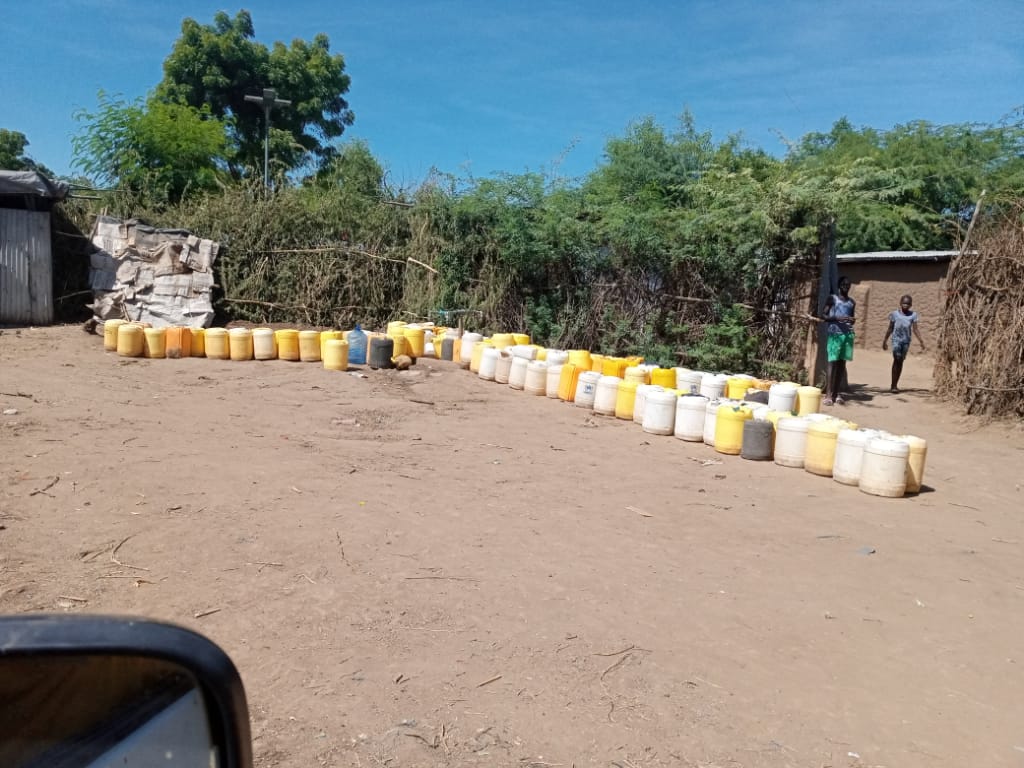By Tolossa Asrat – KANERE Volunteer Writer, September 2021
The weather in Kakuma Refugee Camp is generally characterized by humid and high temperatures (over 35 degrees Celsius /95 Fahrenheit). January, February, and March are the hottest months, with temperatures reaching 38 degrees Celsius/100.4 Fahrenheit.

The short rainy season occurs from November–December and the long rainy season starts in mid-March and ends in June. The Camp is surrounded by desert and dehydrated landscapes with thorny short bushes. During the dry season (July – August through September), the Kakuma camps were hit hard by water shortages.
Kakuma Refugee Camps have experienced water shortages before, but the problem was never as serious as it is now. The water shortage has been a serious challenge since July 2021 and some water taps of different communities have been dry for days.
“Before the crisis, water was rationed two times per day for almost all communities: in the morning between 7:00 am and 9:00 am and then during lunch hour between 12:00 noon and 2:00 pm,” said Zerihun Lemma, 65-year-old and father who leads a community in Kakuma 3.
Leaders like Zerihun pointed out that the water crisis could bring dangerous consequences during COVID-19.
Refugees have experienced severe water shortages since the beginning of the dry season. People have been leaving their community and traveling long distances to fetch water. Some are forced to buy water from informal traders who sell 20 liters of a jerrycan of water at KSh 30-50.
“Our taps have been dried for a couple of days. It is a pity to see old women and children waiting and begging for over half a day at the gates of NGOs, schools, and field offices. We are asking for an urgent intervention from UNHCR and NRC,” said a leader who wished to remain anonymous.
UNHCR’s water policy allows one to take a minimum of 20-litre of water per person per day, however, people are accustomed to taking more than the recommended minimum amount. Previously, larger families have opted to buy water from women refugees traders to avoid long queues and potential conflicts.
“There has been a three-month water shortage, which is forcing us to buy from local vendors who sell at KSh 50 per 20-litre jerrycan,” said Halima Aden, a Kakuma 1, Zone 1, and Block 5 resident.
In Kakuma 1, which has a high population density, water shortage can provoke conflict between members of communities.
Women selling water fill gaps for people who want to avoid potential conflicts, and selling water is a livelihood source for women living in Kakuma 1.
The traders have been supplying water to Ethiopian and Somali communities at KSh 20 per 20-litre, but members from the host community have recently been selling water at a higher price of KSh 50 per 20-litre to Kakuma 1 refugees.
“I used to get between KSh 300-400 every day. But now, this income is no longer available.” Regina, a water trader, in Kakuma 1.
Selling water was important for people like Regina, as the income helps her provide nutritious food for her children. For many years, such work has been a means of surviving for Regina and her family.
But about a month ago, Regina, a mother of seven children, faced a difficult situation because she could no longer sell water, which has forced her to sell her personal valuables, including a gold necklace, to survive.
“You have to wake up early and queue the entire day to get a 20-litre jerrycan of water, which is not even enough for our daily needs.” Regina said.
Poverty and the lack of income opportunities affect all refugees. However, in Kakuma and Kalobeyei, women are more likely to face distinct and difficult challenges due to camp living situations- as women often go miles outside of camp location to look for water for their families.
The rainfall in Turkana can be highly erratic and unpredictable. “If there is rain in the county, we will not experience water shortage,” said Ibrahim, a leader in Kakuma 1, Zone 1, and Bock 4.
As Ibrahim said, the availability of water is positively correlated with the cumulative rainfall the country receives during a given period. The National Drought Management Authority of Turkana County (NDMA) also supports Ibrahim’s claim. As per July 2021, NDMA forecasted that “dispersed rainfall with temporal distribution of 1-2 days was experienced in some sections of Turkana West.”
However, Regina did not see this coming.
Given the current pandemic and hot climate in Kakuma, refugees need additional water for drinking, cleaning dishes and cloths, taking baths, and cooking meals.
“The violence is now a daily routine at water palaces in most places of Kakuma 3,” Andersen said, a community leader in Kakuma 3. Due to water shortages and rationing, the community members have fight at water points and tensions have existed. Taps are often dry but community members have often lined up at the water point, where there are days when taps are empty.
Besides the dry season and hot weather, maintenance and infrastructural problems have created water shortage, which may lead inter-communal violence in the camps.
